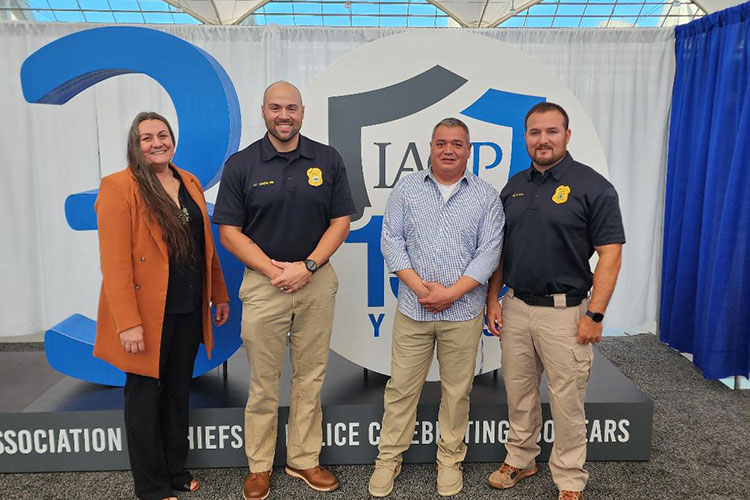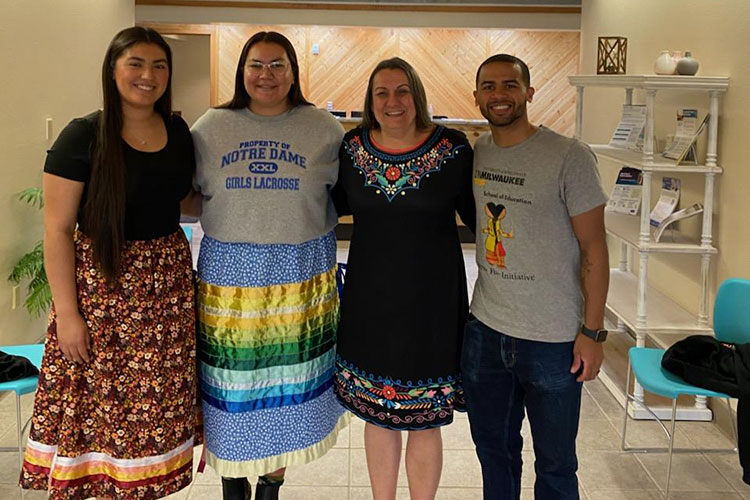Leah Rouse says she’s a partner, not a leader, in her ongoing work with the Oneida and Menominee Nations.
Rouse, an associate professor of educational psychology and counseling psychology, coordinates a team that is working with the Nations on projects to improve access to mental health and wellness in tribal lands in northern Wisconsin.
The Menominee and Oneida Nations face similar challenges to other American Indian communities, according to Rouse and the leaders the Oneida and Menominee projects.
American Indians have the highest rate of death by suicide in Wisconsin; police officers, like others in the profession, face challenges with mental health and wellness; and Oneida Nation High School students, like many others in Wisconsin are still being impacted by the lingering impact of the COVID pandemic.
“Indian country suffered disproportionately during the pandemic,” Rouse said. “There are cumulative disparities due to lack of resources, and generational trauma is widespread. Hundreds of years of colonization have had an impact,” she added.
“The boarding school era had an effect on generations of people removed from their families. We need to help them recover from that.”
A key need, said Rouse, is for Indigenous mental health clinicians who are sensitive to the Nations’ culture and history.
She is partnering with the Oneida and Menominee Nations to boost the numbers of Indigenous people who receive training as school and mental health counselors serving American Indian clients and schools by offering remote access to graduate training.
The Strong Fire Initiative
The federally funded Strong Fire Initiative is helping prepare American Indian school counselors through an innovative virtual master’s program serving students living in tribal communities and rural northern Wisconsin. Being able to live and work in their communities while working toward their degrees helps overcome transportation barriers. The federal grant also provides financial support for the students. The School of Education now has its second cohort in the program, according to Rouse. Students are currently completing practicum course work at the Oneida Nation School District and the Lac du Flambeau community. In the future, students will also be placed at the Menominee Tribal School.
The grant programs are a part of federal efforts to double the number of school-based mental health professionals.
In an interview with the Hechinger Report, Rouse said colleges used to be reluctant to offer online programs in counseling psychology, worrying that quality would suffer. “The pandemic showed we can do quality training and supervision with remote instruction,” she said.
“We recognized the need for increased mental health services with students coming back after two years away during the pandemic,” said Artley Skenadore, principal of the Oneida Nation High school who is working with his team and Rouse on the initiative. “Achievement has taken a dive. We wanted additional support for our school.” The school district had worked with UW-Milwaukee previously, said Skenadore, who earned his undergraduate degree from UWM and has an education doctorate in First Nations education from UW-Green Bay.
The school is focusing on building an American Indian perspective into counseling services, encouraging students to support each other. “That strength of mind and spirit of Strong Fire will make that fire of our tribal nations brighter,” said Skenadore.
Maehnowesekiyah Wellness Center (MWC)
This wellness center is located in an area that has the highest rates of death by suicide in the state. It is also one of the poorest areas in the state, according to Addie Caldwell, director of Wellness Programs. The MWC’s mission is to provide culturally specific alcohol, drug, mental health, adolescent, domestic violence treatment, education and support services for American Indian clients and their families.
For the past four years, Rouse and her team have been working with the center to evaluate programs and provide support through placement of doctoral Counseling Psychology practicum students who work on mental health and substance abuse recovery. Another group of students are involved in epidemiology work on suicide prevention. The work was funded under a larger grant the Menominee Nation was awarded by Indian Health Services to focus on community supported mental health services and suicide prevention.
“Having the collaboration has helped us focus on programs that help prevent suicide and get staff trained on how to respond,” said Caldwell. Although the evaluation of data isn’t finished, anecdotally the center sees suicides going down. Even without the exact numbers, Caldwell added, “one life saved matters.”
Oneida Nation Police Department
Police work is stressful no matter where it’s carried out. Rouse, a former police officer who has done extensive research on law enforcement mental health issues, has been working with a team from the Oneida Nation police force.
“We wanted to not just focus on mental health, but on wellness,” said Lt. Brandon Vande Hei of the department. The wellness program, which started in 2020 includes check-ins and other supports, and was recently recognized by the International Association of Chiefs of Police, the largest and most distinguished professional association for police leaders.

With Rouse’s help, the department developed an in-house, holistic wellness program based on the best practices in law enforcement wellness and traditional Oneida cultural values.
“We are trying to make the focus congruent with tribal values,” said Vande Hei. “Police officers can serve as role models. We can make change in the community so it’s important that we have culturally specific training and competence.”
The citation from the IACP award read: “Through his leadership in this initiative, Lt. Vande Hei acts, in the most traditional sense, as a warrior for the people.”
Overall, said Rouse, the programs focus on the close family ties and taking care of each other that are an important part of American Indian heritage. “We stress that it’s important to be a good relative.”
